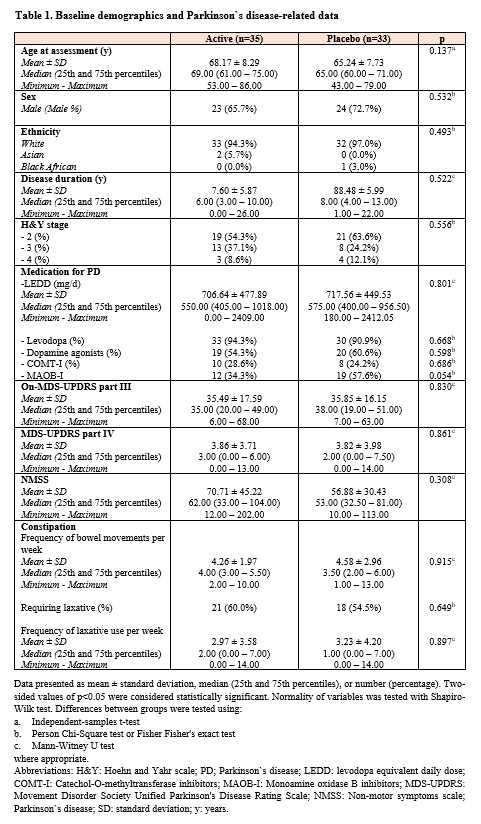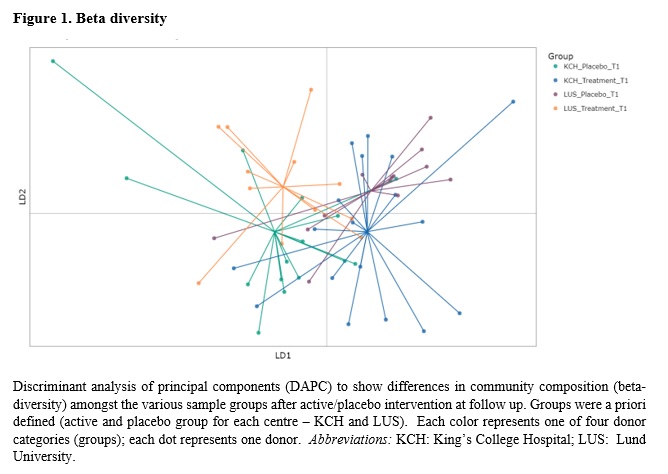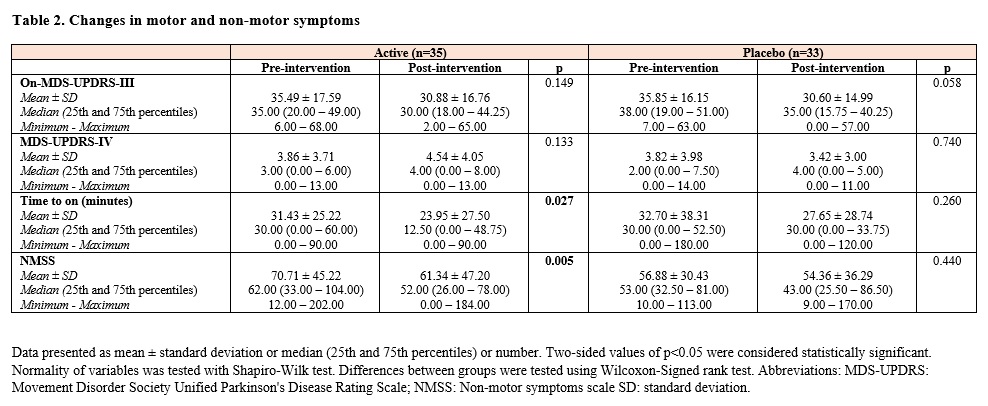Category: Parkinson’s Disease: Clinical Trials
Objective: To evaluate the effect of a four-strain probiotic (Lacticaseibacillus rhamnosus, Enterococcus faecium, Lactobacillus acidophilus, Lactiplantibacillus plantarum) on gut microbiota composition, motor and non-motor symptoms (NMS) in patients with Parkinson’s disease (PD) and constipation.
Background: Gut dysbiosis and involvement of the ‘gut-brain’ axis have been described in PD and could be modulated by use of probiotics [1]. Probiotics are a useful treatment for the management of constipation in PD. However, their effect on gut microbiota composition, motor and NMS in people with PD is still unknown [2].
Method: Multicentre, randomised, double-blind, placebo-controlled trial of 74 people with PD and constipation according to the ROME IV criteria who were randomised (1:1) to either four-strain probiotic (n=38) or placebo (n=36). The primary outcome was changes in gut microbiota composition (shallow shotgun sequencing) after 12 weeks of intervention. Secondary outcome measures were changes in ‘time to on’, MDS Unified Parkinson’s disease rating scale (UPDRS) parts III and IV and NMS scale (NMSS) scores after intervention.
Results: Data from 35 and 33 participants from the active and placebo group, respectively, were analysed (Tab. 1). Between-group differences in beta-diversity were observed at follow up (Fig. 1) Specifically, the active treatment was associated with enrichment of bacteria with health-beneficial properties (bacterial families Odoribacteraceae, Enterococcaceae, genera Veillonella, and species Blautia faecicola). Additionally, a significant reduction in ‘time to on’ (p=0.027) and NMSS total score (p=0.005) were observed in the active group, the latter driven by a reduction in sleep/fatigue (p=0.007) and gastrointestinal (p<0.001) domain scores (Tab. 2).
Conclusion: This four-strain probiotic was effective to beneficially enrich the gut microbiota, reduce ‘time to on’ and total NMS burden in people with PD and constipation. We believe this is the first such data of this kind.
References: 1. Metta V, Leta V, Mrudula KR, Prashanth LK, Goyal V, Borgohain R, Chung-Faye G, Chaudhuri KR. Gastrointestinal dysfunction in Parkinson’s disease: molecular pathology and implications of gut microbiome, probiotics, and fecal microbiota transplantation. J Neurol. 2022 Mar;269(3):1154-1163. doi: 10.1007/s00415-021-10567-w. Epub 2021 Apr 21. PMID: 33881598.
2. Leta V, Ray Chaudhuri K, Milner O, Chung-Faye G, Metta V, Pariante CM, Borsini A. Neurogenic and anti-inflammatory effects of probiotics in Parkinson’s disease: A systematic review of preclinical and clinical evidence. Brain Behav Immun. 2021 Nov;98:59-73. doi: 10.1016/j.bbi.2021.07.026. Epub 2021 Aug 5. PMID: 34364965.
To cite this abstract in AMA style:
V. Leta, P. Zinzalias, J. Staunton, L. Batzu, D. Trivedi, F. Jernstedt, K. Rosqvist, J. Timpka, T. van Vliet, A. Podlewska, M. Parry, D. van Wamelen, A. Rizos, G. Chung-Faye, A. Borsini, C. Pariante, P. Odin, K. Ray Chaudhuri. Efficacy of a four-strain probiotic on gut dysbiosis, motor and non-motor symptoms in Parkinson`s disease: a multicentre randomised controlled trial [abstract]. Mov Disord. 2023; 38 (suppl 1). https://www.mdsabstracts.org/abstract/efficacy-of-a-four-strain-probiotic-on-gut-dysbiosis-motor-and-non-motor-symptoms-in-parkinsons-disease-a-multicentre-randomised-controlled-trial/. Accessed January 4, 2026.« Back to 2023 International Congress
MDS Abstracts - https://www.mdsabstracts.org/abstract/efficacy-of-a-four-strain-probiotic-on-gut-dysbiosis-motor-and-non-motor-symptoms-in-parkinsons-disease-a-multicentre-randomised-controlled-trial/



